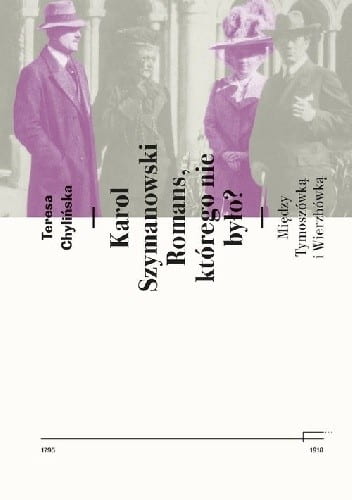New Szymanowski Book
Throughout her long and intellectually rich life Teresa Chylińska, the world’s preeminent scholar of Karol Szymanowski, has authored a great number of books and even greater number of articles about this most important mid-20th century Polish composer. Chylińska’s latest book, Karol Szymanowski—Roman, którego nie było? [Karol Szymanowski—A Romance that did not happen?] provides a fascinating look into Szymanowski’s formative years, spent on the family estate, Tymoszówka, now part of Eastern Ukraine. The author’s breathtaking scholarship and her impressively intimate knowledge of all things connected to Szymanowski’s life as well as that of his family and friends are on full display in this latest volume, just issued by Polish Music Publishers [PWM].
With a subtitle, Między Tymoszówką i Wierzbówką [between Tymoszówka and Wierzbówka], Chylińska focuses on a heretofore unexplored subject of Szymanowski’s Russian neighbors, the Davidov family, whose Wierzbówka estate was located only a few miles from Szymanowski’s ancestral home. And what amazing neighbors they were—friends and relatives of such aristocratic families as Bariatinsky or Dolgorukiy, who hosted and entertained in their Ukrainian retreat the musical and literary elite, including Tchaikovsky, Tolstoy, Artur Rubinstein and Rimsky-Korsakov to name but a few.
Chylińska’s mastery of the narrative and her lively pen in describing the country life as well as European peregrinations of Szymanowski and Natalia Davidov are based on extensive and newly-discovered sources, many quoted here for the first time. Facsimiles of tenderly phrased letters in French between Karol Szymanowski and Natialia Davidoff are reproduced alongside dozens of fascinating and rare photographs. All kinds of connections—musical of course (Szymanowski dedicated his Second Piano Sonata to Natalia Davidoff) as well as social—come alive on these pages thanks to Chylińska’s magnificent research. Her book captures the spirit of intellectual and artistic life of Szymanowski and his circle; it also provides a perfect mis-en-scène for the drama that unfolded in the early decades of the 20th century in that now forgotten part of the world. Szymanowski’s and Davidov’s amitié amoureuse survived the tragedy of World War I and the brutality of the Bolshevik Revolution that eventually sent both of their families into exile. Their correspondence resumed a few years after the war but, alas, whatever the two protagonists felt for each other could not be resurrected. At the age of 58 Natalie Davidov committed suicide in 1933, and Szymanowski, his health failing for years, died only four years later at the age of 55.
Thanks to the author—a longtime friend and supporter of the Polish Music Center—and the good offices of PWM, this very special book is now in our library. Anyone reading Polish is strongly encouraged to become familiar with this publication. An English version of it would enlarge a circle of fans of this exceptional tale even further.
New additions to the Henry Wars Collection
Another friend and contributor to the PMC’s archives, Dr. Ewa Muchnick, recently donated some interesting recordings including a rare 45-rpm pressing of Henry Vars’s hit film song “Good Love,” as performed by Ruth Olay and the Bob Thompson Orchestra. Another 7-inch vinyl pressing from Poland featured Henry Vars’s “Już nie zapomnisz mnie” from the 1930s, this time sung in English as “You Will Never Forget Me” by Jerzy Połomski with the Turewicz Instrumental Ensemble. The same Pronit 45-rpm disc also features hits by other 1930s film and cabaret composers in Poland—A. Gold, Z. Karasiński and J. Petersburski.
Other highlights of this donation include 2 LPs from the 1970s with Christmas music: Muza XL 0184. Boże Narodzenie w Polsce [Christmas in Poland], sung by Alina Bolechowska and Men’s Chorus of the St. James Church in Warsaw and Muza Xl 0190. Mazowsze śpiewa kolędy [Mazowsze Sings Christmas Carols].
New Chopin recording & article
Our longtime friend in the Santa Barbara area, Betty Harford-Naszódy, is always on the lookout for Polish music memorabilia in her area. Her most recent finds include an early 20th century Peters Edition album of Chopin’s Nocturnes and a clipping from the April 1937 issue of Etude Magazine of an article by Mark Hambourg, “Nocturne in C Minor by Chopin.” As a bonus, there is also a short editorial by Rowena Gailey, “Why Professional Pianists Practice Slowly.”
As always, we are most grateful to all our donors. Dziękujemy!
